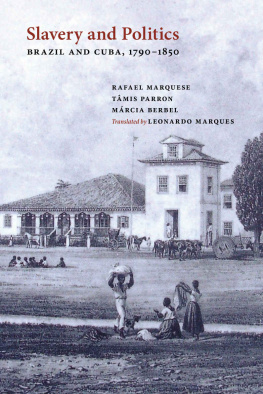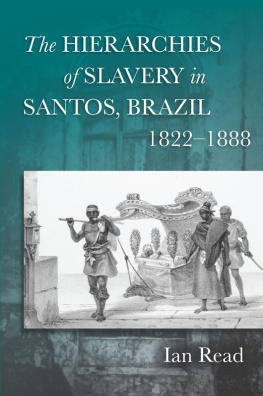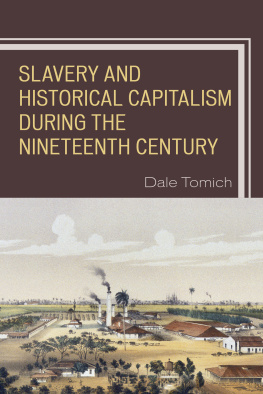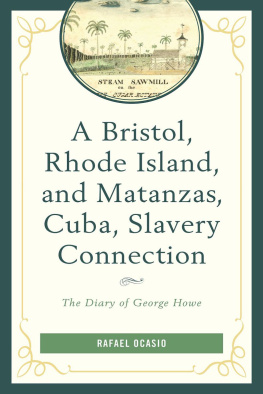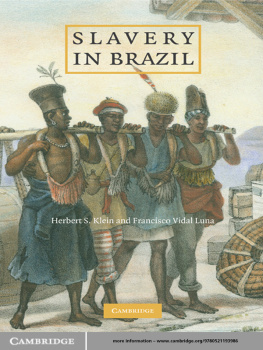Rafael Marquese - Slavery and Politics: Brazil and Cuba, 1790-1850
Here you can read online Rafael Marquese - Slavery and Politics: Brazil and Cuba, 1790-1850 full text of the book (entire story) in english for free. Download pdf and epub, get meaning, cover and reviews about this ebook. year: 2016, publisher: University of New Mexico Press, genre: Politics. Description of the work, (preface) as well as reviews are available. Best literature library LitArk.com created for fans of good reading and offers a wide selection of genres:
Romance novel
Science fiction
Adventure
Detective
Science
History
Home and family
Prose
Art
Politics
Computer
Non-fiction
Religion
Business
Children
Humor
Choose a favorite category and find really read worthwhile books. Enjoy immersion in the world of imagination, feel the emotions of the characters or learn something new for yourself, make an fascinating discovery.
- Book:Slavery and Politics: Brazil and Cuba, 1790-1850
- Author:
- Publisher:University of New Mexico Press
- Genre:
- Year:2016
- Rating:4 / 5
- Favourites:Add to favourites
- Your mark:
- 80
- 1
- 2
- 3
- 4
- 5
Slavery and Politics: Brazil and Cuba, 1790-1850: summary, description and annotation
We offer to read an annotation, description, summary or preface (depends on what the author of the book "Slavery and Politics: Brazil and Cuba, 1790-1850" wrote himself). If you haven't found the necessary information about the book — write in the comments, we will try to find it.
Slavery and Politics: Brazil and Cuba, 1790-1850 — read online for free the complete book (whole text) full work
Below is the text of the book, divided by pages. System saving the place of the last page read, allows you to conveniently read the book "Slavery and Politics: Brazil and Cuba, 1790-1850" online for free, without having to search again every time where you left off. Put a bookmark, and you can go to the page where you finished reading at any time.
Font size:
Interval:
Bookmark:
Slavery and Politics
BRAZIL AND CUBA, 17901850
RAFAEL MARQUESE
TMIS PARRON
MRCIA BERBEL
Translated by LEONARDO MARQUES

2016 by the University of New Mexico Press
All rights reserved. Published 2016
Printed in the United States of America
21 20 19 18 17 16 1 2 3 4 5 6
The Library of Congress has cataloged the printed edition as follows:
Berbel, Mrcia Regina.
[Escravido e poltica. English]
Slavery and politics : Brazil and Cuba, 17901850 / Rafael de Bivar Marquese, Tmis Peixoto Parron, Mrcia Regina Berbel ; translated by Leonardo Marques.
pages cm
Translation of: Escravido e poltica : Brasil e Cuba, c. 17901850 / Mrcia Berbel, Rafael Marquese, Tmis Parron.
Includes bibliographical references and index.
ISBN 978-0-8263-5647-5 (cloth : alk. paper) ISBN 978-0-8263-5648-2 (pbk. : alk. paper) ISBN 978-0-8263-5649-9 (electronic)
1. SlaveryBrazilHistory19th century. 2. SlaveryCubaHistory19th century. 3. SlaveryGovernment policyBrazil. 4. SlaveryGovernment policyCuba. 5. BrazilPolitics and government19th century. 6. CubaPolitics and government19th century. I. Marquese, Rafael de Bivar, 1972 II. Parron, Tmis. III. Title.
HT1126.B4513 2016
306.362098109034dc23
2015016441
Funding for this translation was provided by FAPESP.
Cover illustration: Jean-Victor Frond, Fazenda de Quissam nas cercanias de Campos, lithograph.
Cover designed by Catherine Leonardo
Interior designed by Felicia Cedillos

I hope that everything that is good for agriculture, and can incite imitation, will be published, which is the reason why I mention what the Consulado de Havana has done.... one [of its] greatest concerns has always been to stimulate agriculture, especially for what belongs to the less considerable establishments, because it contributes more safely to the increase and progress both of population and wealth.... This consideration led [it]... to treat coffee cultivators favorably, their production being one of the most precious of America.
DOMINGOS BORGES DE BARROS, Memria sobre o caf, 1813
The wealth of the Brazilian Empire has similar foundations to those of Cuba and Puerto Rico, and is developed with the same means. Therefore, it is very important for the administration of our Antilles to study in detail the state of the black race in Brazil, the means used in agriculture and industry, and the increase or decrease experienced by slavery and the slave trade.
MARQUIS OF PIDAL, Spanish minister of foreign affairs, 1849
MORE THAN THREE decades separate the quotations above. The first was written by Domingos Borges de Barros and published in O Patriota (the Patriot) in August 1813. The son of an important slaveholding family from the
In 1813, the Portuguese Crown, now based in Rio de Janeiro, was witnessing the first steps of the internationalization of British abolitionism, which would become a major concern for Brazil three decades later, when the second quotation above was written. In fact, the quotation comes from a letter written in April 1849 from the Spanish minister of foreign affairsthe marquis of Pidalto his diplomatic representative in Rio de Janeiro. The moment was delicate for Spain due to revolutionary events in France, a diplomatic break with Britain, and, especially, burgeoning plans for the United States to annex Cuba (from both the Spanish island and the US South).
Like others of his time, Pidal believed that African slavery was the key to Spanish control over Cuba, which explains his interest in the Brazilian situation. Because of this, he sent an extensive questionnaire to the Spanish consul in Rio de Janeiro, Jos Delaval y Rincn, about the demographics of the black population in the Brazilian Empire, their experiences with free labor in plantations, the policies to preserve slavery in the absence of the transatlantic slave trade, the size of the illegal traffic, the actions of the British Royal Navy in Brazil, the penalties for slave traders, and, finally, the political strategy of the Brazilian government in relation to the contraband slave trade.
The circumstances and the authors of the two quotations above, therefore, differed sharply from each other. The immediate contexts of these documents cannot be compared, but we believe they represented different conjunctures of a single historical structure. This structure brought together the destinies of Brazil and Cuba during the nineteenth century.
This is the starting point of the present book. It explores the relationship between slavery and politics in Brazil and Cuba between the 1790s and the Even rarer are studies that integrate both societies into the broader context of nineteenth-century global capitalism.
Despite the differences between their political trajectories after the 1820s, Brazil and Cuba shared a common nineteenth-century history due to the centrality of slavery in both societies. This shared history started in the late eighteenth century with the enlightened projects for the economic recovery of Portugal and Spain, as well as with the responses from planter classes in Portuguese America and Cuba to the economic collapse of Saint-Domingue. After 1820, Brazil and Cuba were the only regions in the New World that continued to be supplied by a massive transatlantic traffic of enslaved Africans. For this reason, the two slave economies quickly became the leading coffee and sugar producers in the world. But the persistence of the slave trade also forced the Brazilian and Cuban slaveholding classes to deal with Great Britain and its intense diplomatic pressure.
In a world of American republics extending from north (the United States) to south (Chile), the political histories of the Empire of Brazil and the Spanish colony of Cuba were unparalleled. In the constitutional experiences leading to these political configurations (Brazil as an independent monarchy and Cuba as a province or colony of the Spanish monarchy), the proslavery platforms of Brazilian and Cuban representatives became crucial. In the Cortes of Cdiz (18101814), Madrid (18201823), and Lisbon (18211822), and in the Constituent Assembly of Rio de Janeiro (1823), Brazilian and Cuban deputies offered clear strategies to preserve slavery in their societies, as they would repeatedly reaffirm whenever the institution was questioned in subsequent years.
The main objective of this book is to examine the arguments and strategies in favor of slavery and the slave trade that supported the political projects of Brazilian and Cuban slaveholders in the aftermath of the Haitian Revolution, in the Iberian constitutional experiences of the 1810s and 1820s, in parliamentary experiences of the nineteenth century, and in other situations when the problem of slavery was at the center of debates. Our intention is to also discuss how these political arguments and strategies in the Brazilian and Spanish Empires were part of the broader history of an emerging liberal order.
Our argument is based on four main points. First, Brazil and Cuba shared a common space of experience that can be traced back to their participation in the Iberian Atlantic system. This shared space of experience became much narrower after the series of events marking the conjuncture of crisis at the turn of the nineteenth century, such as the American Revolution, the rise of British abolitionism, the Saint-Domingue Revolution, the collapse of Iberian monarchies, the internationalization of British pressure against the transatlantic slave trade, and the expansion of the global market for tropical goods that accompanied the growth of industrialization. Second, as a result of this same space of experience, the planter classes of Brazil and Cuba had a similar horizon of expectation based on the idea of perpetuating slavery. Third, these slaveholding classes successfully imposed their proslavery designs on the Brazilian and Spanish Empires in the early 1820s, developing political arrangements that lasted without major problems until the 1860s. As a consequence, both Cuba and Brazil experienced the crisis of slavery over the following two decades. And fourth, proslavery arguments in Cuba and Brazil can be traced back to responses to the first critiques of slavery in the late eighteenth century, but they also acquired particular characteristics in the Brazilian and Cuban environments. In any case, proslavery ideologues in both regions shared many views since at least the 1790s.
Next pageFont size:
Interval:
Bookmark:
Similar books «Slavery and Politics: Brazil and Cuba, 1790-1850»
Look at similar books to Slavery and Politics: Brazil and Cuba, 1790-1850. We have selected literature similar in name and meaning in the hope of providing readers with more options to find new, interesting, not yet read works.
Discussion, reviews of the book Slavery and Politics: Brazil and Cuba, 1790-1850 and just readers' own opinions. Leave your comments, write what you think about the work, its meaning or the main characters. Specify what exactly you liked and what you didn't like, and why you think so.

